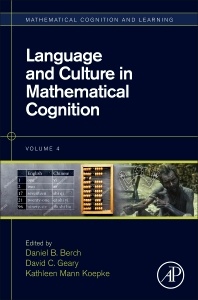Language and Culture in Mathematical Cognition Mathematical Cognition and Learning (Print) Series
Coordonnateurs : Berch Daniel B., Geary David C., Mann Koepke Kathleen

Language and Culture in Mathematical Cognition, First Edition focuses on the role of linguistic and cultural factors in math cognition and development. It covers a wide range of topics, including analogical mapping in numerical development, arithmetic fact retrieval in the bilingual brain, cross-cultural comparisons of mathematics achievement, the shaping of numerical processing by number word construction, the influence of Head Start programs, the mathematical skills of children with specific language impairments, the role of culture and language in creating associations between number and space, and electrophysiological studies of linguistic traces in core knowledge at the neural level.
2. The Effects of Language on Number Word Learning and Estimation
3. Arithmetic in the Bilingual Brain
4. Linguistic Traces in Core Numerical Knowledge
5. Number Knowledge in Preschool Dual-Language Learners from Low-Income Households
6. Mathematical Skills of Children with Specific Language Impairments: Testing Developmental Theory
7. Contributions of Culture and Language to the Development of Space-Number Associations
8. How Culturally Predominant Reading Direction and Number Word Construction Influence Numerical Cognition and Mathematics Performance
9. The Cross-National Learning Gap: Cognitive Mechanisms of Cultural Differences in Mathematics
10. Cultural Comparisons of Children’s Mathematics Achievement: Numerical Language and Core Knowledge
11. Disentangling Linguistic and Experiential Factors as Predictors of Young Children's Early Numeracy Skills
12. Counting Systems as Cultural Tools for Numerical Cognition
13. Linguistic and Cultural Processes in Elementary Mathematics: Studies from a Remote Papua New Guinea Community
Academics/researchers, graduate and undergraduate students specializing in the following disciplines: cognitive psychology; infant cognition; cognitive neuroscience; behavioral genetics; educational psychology; early childhood education; and special education
Daniel B. Berch is Professor of Educational Psychology and Applied Developmental Science at the University of Virginia’s Curry School of Education. Prior to this position, he was Associate Dean for Research and Faculty Development at the Curry School. Before coming to the University of Virginia, Professor Berch served as Associate Chief of the Child Development and Behavior Branch at the National Institute of Child Health and Human Development, NIH. His previous federal service included a year spent as a Senior Research Associate at the U. S. Department of Education, advising the Assistant Secretary for Educational Research and Improvement. Professor Berch is a cognitive developmental psychologist with interests ranging from the development of numerical cognition and mathematical learning disabilities (MLD) to evolutionary perspectives on education. He has published articles on children’s magnitude representations, the development of number sense, and the role of working memory in MLD. He is senior editor of the book, Why is math so hard for some children? The nature and origins of mathematical learning difficulties and disabilities (co-edited by Michele Mazzocco).
Among other honors, he received the NIH Award of Merit, was elected Fellow of the American Psychological Association’s Division of Experimental Psychology, served as an ex officio member of the U.S. Department of Education’s National Mathematics Advisory Panel commissioned by President George W. Bush, was elected to the Evolution Institute’s Scientific Advisory Board (and chair’s its Education Subcommittee), was appointed to the AIM Academy’s Research Advisory Board, and served as a member of the Professional Advisory Board of the National Center for Learning Disabilities for six years. During the past several years, Professor Berch has been working on the implications of evolutionary theory for educational research and practice, publishing a book chapter on instructing evolved minds, serving a
- Includes cutting-edge findings, innovative measures, recent methodological advances and groundbreaking theoretical developments
- Synthesizes research from various subdomains of math cognition research
- Covers the full complement of research in mathematical thinking and learning
- Informs researchers, scholars, educators, students and policymakers
Date de parution : 01-2018
Ouvrage de 364 p.
15x22.8 cm
Thème de Language and Culture in Mathematical Cognition :
Mots-clés :
Central conceptual knowledge; Cognitive development; Counting systems; Cross language comparison; Cross-cultural comparison; Cross-cultural comparisons; Cultural influences; Culture; Distributed cognition; Early numeracy; Finger counting; Home numeracy activities; Language; Mathematical cognition; Mathematics; Mathematics achievement; Mathematics language; Number; Number language; Number notation; Numeration systems; Numerical cognition; Numerical language characteristics; Oksapmin; Papua New Guinea; Parents' academic expectations; Parents' education; Place value; Preschoolers; Representational effect; Transcoding; Verbal counting



